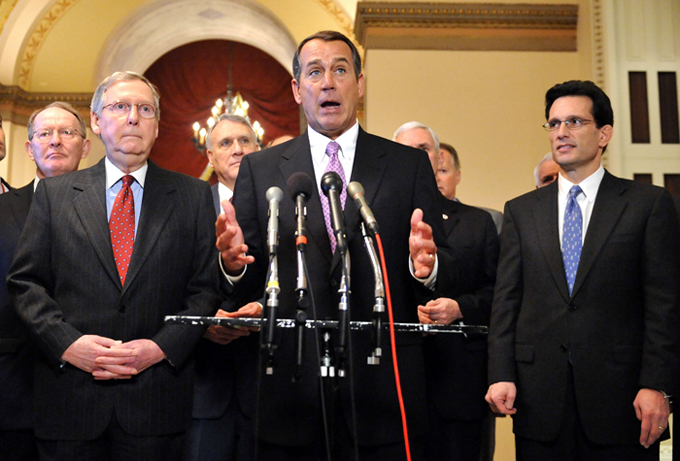The Republican plan to stick BP with the full cost of the Gulf oil spill lacks the teeth to actually make BP pay for the damages caused by the worst spill in U.S. history, according to Democrats and experts on offshore drilling law who spoke with TPM.
Until House Minority Leader John Boehner went on the record this weekend in support of lifting the $75 million cap on BP’s liability for damages caused by the catastrophe, he and his party for weeks had opposed Democratic efforts to retroactively and permanently lift that cap so that BP ponies up for this spill and so that damages from future spills are the full responsibility of the oil companies that cause them.
Last week, as controversy over the GOP’s position on BP raged, Boehner’s office suggested to me that a better way to hold the oil giant accountable for the current spill would be to pass legislation sponsored by Sen. David Vitter (R-LA) who proposes lifting the cap on BP, but leaving the $75 million cap in place — punting for now on the question of what to do about future spills.
The big problem: Democrats and experts say it won’t work.
Vitter’s bill, they say, doesn’t require BP to do anything, doesn’t address the systemic problem of the liability cap, and may not even be constitutional — all things the Democratic alternative, pushed by Rep. Rush Holt (D-NJ) and Sen. Bob Menendez (D-NJ), would address.
“This bill has massive loopholes that BP could walk right through, and it leaves in place the liability limit for every future oil spill,” Menendez spokesman Afshin Mohamadi tells me. “Protecting oil companies is a political albatross around the necks of Republicans, so they are using this bill as a talking point. But it’s nothing more that — it has no teeth.”
Vitter’s bill is based upon BP’s public promise to pay damages well in excess of the $75 million they’re bound by law to pay. Given that commitment, Vitter’s legislation requires the Interior Secretary to renegotiate BP’s lease on the drilling site of the Deepwater Horizon well to make the company’s exposure unlimited. But what if BP refuses to renegotiate or doesn’t agree to the terms the Interior Department proposes?
“BP could just walk away from the renegotiation and say ‘take back your lease,'” emails John Lowe, the George W. Hutchison Professor of Energy Law at Southern Methodist University. “[W]ere I representing BP and this bill became law, that would be my position.”
Lowe adds, however, that political and business constraints would likely prevent BP from behaving so ruthlessly.
According to Kevin Franck, spokesman for the Louisiana Democrats, who hope to unseat Vitter this November, it would be more accurate to say “Vitter’s bill could create a situation under which BP could possibly and voluntarily pay more than $75 million under Oil Pollution Act. It does not require BP to do a single thing.”
Democrats on the Hill will soon be circulating this fact sheet that lists all of their objections to the Vitter plan. One of the main criticisms, as explained in this letter by Stephen Vladick, Professor of Law at American University, is that by singling out a single company, the Vitter plan might violate the Constitution’s Bill of Attainder Clause.
Democrats may have problems of their own, though. What Holt and Menendez propose to do — retroactively lift the cap on oil companies — raises legal issues as well. They suggest that the Superfund bill of 1980, which forced polluters to pay for cleanup of toxic waste, is a comparable precedent. The Justice Department, anticipating this argument, has publicly stated that there would be no legal impediment to retroactively raising the cap.
The issue has become so politically potent that you can bet Democrats will keep hammering away to get their bill through Congress. But if nothing passes, the next best hope for assuring that BP covers all damages might be if the courts find that the company acted with gross negligence in causing the spill or violated federal law or regulations. If that happens, then the liability cap disappears altogether.






